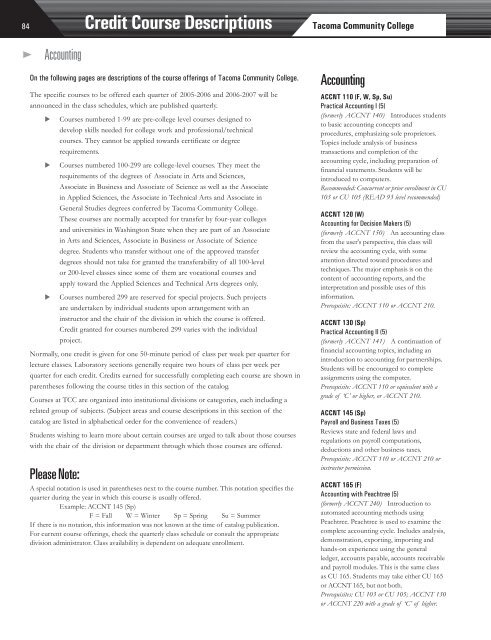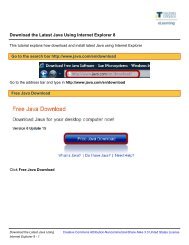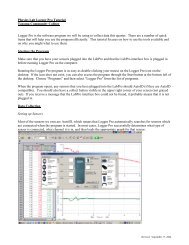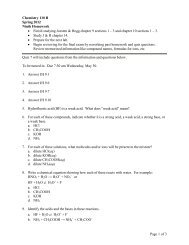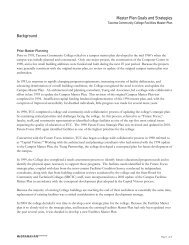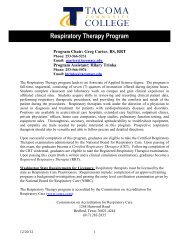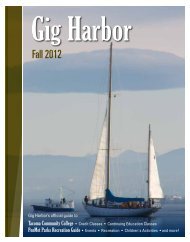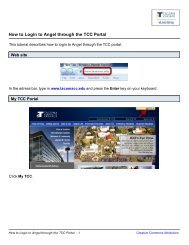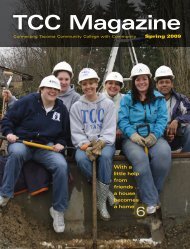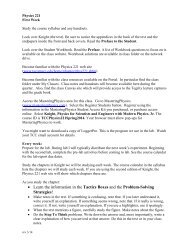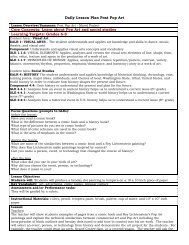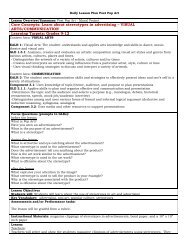84 Credit Course Descriptions<strong>Tacoma</strong> <strong>Community</strong> <strong>College</strong>AccountingOn the following pages are descriptions of the course offerings of <strong>Tacoma</strong> <strong>Community</strong> <strong>College</strong>.The specific courses to be offered each quarter of <strong>2005</strong>-2006 and 2006-20<strong>07</strong> will beannounced in the class schedules, which are published quarterly.Courses numbered 1-99 are pre-college level courses designed todevelop skills needed for college work and professional/technicalcourses. They cannot be applied towards certificate or degreerequirements.Courses numbered 100-299 are college-level courses. They meet therequirements of the degrees of Associate in Arts and Sciences,Associate in Business and Associate of Science as well as the Associatein Applied Sciences, the Associate in Technical Arts and Associate inGeneral Studies degrees conferred by <strong>Tacoma</strong> <strong>Community</strong> <strong>College</strong>.These courses are normally accepted for transfer by four-year collegesand universities in Washington State when they are part of an Associatein Arts and Sciences, Associate in Business or Associate of Sciencedegree. Students who transfer without one of the approved transferdegrees should not take for granted the transferability of all 100-levelor 200-level classes since some of them are vocational courses andapply toward the Applied Sciences and Technical Arts degrees only. Courses numbered 299 are reserved for special projects. Such projectsare undertaken by individual students upon arrangement with aninstructor and the chair of the division in which the course is offered.Credit granted for courses numbered 299 varies with the individualproject.Normally, one credit is given for one 50-minute period of class per week per quarter forlecture classes. Laboratory sections generally require two hours of class per week perquarter for each credit. Credits earned for successfully completing each course are shown inparentheses following the course titles in this section of the catalog.Courses at TCC are organized into institutional divisions or categories, each including arelated group of subjects. (Subject areas and course descriptions in this section of thecatalog are listed in alphabetical order for the convenience of readers.)Students wishing to learn more about certain courses are urged to talk about those courseswith the chair of the division or department through which those courses are offered.Please Note:A special notation is used in parentheses next to the course number. This notation specifies thequarter during the year in which this course is usually offered.Example: ACCNT 145 (Sp)F = Fall W = Winter Sp = Spring Su = SummerIf there is no notation, this information was not known at the time of catalog publication.For current course offerings, check the quarterly class schedule or consult the appropriatedivision administrator. Class availability is dependent on adequate enrollment.AccountingACCNT 110 (F, W, Sp, Su)Practical Accounting I (5)(formerly ACCNT 140) Introduces studentsto basic accounting concepts andprocedures, emphasizing sole proprietors.Topics include analysis of businesstransactions and completion of theaccounting cycle, including preparation offinancial statements. Students will beintroduced to computers.Recommended: Concurrent or prior enrollment in CU103 or CU 105 (READ 93 level recommended)ACCNT 120 (W)Accounting for Decision Makers (5)(formerly ACCNT 150) An accounting classfrom the user's perspective, this class willreview the accounting cycle, with someattention directed toward procedures andtechniques. The major emphasis is on thecontent of accounting reports, and theinterpretation and possible uses of thisinformation.Prerequisite: ACCNT 110 or ACCNT 210.ACCNT 130 (Sp)Practical Accounting II (5)(formerly ACCNT 141) A continuation offinancial accounting topics, including anintroduction to accounting for partnerships.Students will be encouraged to completeassignments using the computer.Prerequisite: ACCNT 110 or equivalent with agrade of ‘C’ or higher, or ACCNT 210.ACCNT 145 (Sp)Payroll and Business Taxes (5)Reviews state and federal laws andregulations on payroll computations,deductions and other business taxes.Prerequisite: ACCNT 110 or ACCNT 210 orinstructor permission.ACCNT 165 (F)Accounting with Peachtree (5)(formerly ACCNT 240) Introduction toautomated accounting methods usingPeachtree. Peachtree is used to examine thecomplete accounting cycle. Includes analysis,demonstration, exporting, importing andhands-on experience using the generalledger, accounts payable, accounts receivableand payroll modules. This is the same classas CU 165. Students may take either CU 165or ACCNT 165, but not both.Prerequisites: CU 103 or CU 105; ACCNT 130or ACCNT 220 with a grade of ‘C’ of higher.
<strong>2005</strong>-20<strong>07</strong> <strong>Catalog</strong>Credit Course Descriptions 85ACCNT 175 (W)Accounting with QuickBooks (5)(formerly ACCNT 241) Introduction toautomated accounting methods usingQuickBooks. QuickBooks is used to examinethe complete accounting cycle. Includesanalysis, demonstration, exporting, importingand hands-on experience using the generalledger, accounts payable, accounts receivableand payroll modules. This is the same classas CU 175. Students may take CU 175 orACCNT 175, but not both.Prerequisites: ACCNT 165 or CU 165 with agrade of ‘C’ or higher.ACCNT 210 (F, W, Sp, Su)Accounting Principles - Financial I (5)Emphasis is on the development andinterpretation of financial statements: thebalance sheet, income statement and thestatement of owner’s equity.ACCNT 220 (F, W, Sp)Accounting Principles - Financial II (5)Continuation of ACCNT 210. Introducesaccounting for long-term debt andinvestments. Examines the measuring andreporting of Stockholders’ Equity,consolidated statements and the preparationof the Statement of Cash Flows.Introduction to methods used to interpretfinancial statements.Prerequisite: ACCNT 210 with a ‘C’ or higher.ACCNT 230 (F, W, Sp, Su)Accounting Principles: Managerial (5)Introduction to cost concepts such as costvolume-profitanalysis and the budgetingprocess. Examines methods to determineproduct costs of a manufacturing businessand the methods employed to control costs,such as the use of the standard cost system.Prerequisite: ACCNT 210 with a ‘C’ or higher.ACCNT 250 (W)Federal Income Tax (5)Federal income tax for the layman,accounting student, working accountant/bookkeeper and small business owner, withspecial emphasis on tax issues affectingindividuals.ACCNT 290 (F, W, Sp)Work Internship (5)During one quarter of the sophomore year,students may receive college credits forhands-on accounting work experience andtraining in a private or public sectororganization.Prerequisite: Program Chair permission.ACCNT 299Independent Study (1-5)Study on an individual basis.Prerequisite: Program chair permission.Administration ofLaw and JusticeADJ 100 (F, W, Sp, Su)Introduction to Administration of Justice (5)History and evolution of the policeprofession; ethics and professionalization;the correlation between the police, thecourts and corrections in the criminal justicesystem; court organization procedures andfunctions; survey of professional careeropportunities and qualifications required;overview of current police practices.ADJ 101 (F, W, Sp, Su)Criminal Law (5)Introduction to statutory law covering crimesagainst persons and property. WashingtonState law is emphasized regarding history oflaws, common, and statutory law. Laws ofarrest, act and intent, parties to crime,divisions of crime, principles and accessories,and penalties are covered. Course specificscenarios will be analyzed.Prerequisite: Assessment at college-level English andreading.ADJ 102 (F, Sp)Criminal Procedure and Evidence (5)Discover kinds and rules of evidence,conclusions, opinions, and expert witnesstestimony. Discussion of Exclusionary Ruleas it pertains to rules of search and seizure,criminal procedure, due process andconstitutional guarantees. Specific scenarioswill be analyzed to ensure understanding ofprocedural due process as well as judicial dueprocess.Prerequisite: Assessment at college-level English andreading.ADJ 103 (W)<strong>Community</strong> Policing (5)This course presents various problem-solvingmodels that seek to improve police efficiency,lower crime, and raise the perception ofsafety within a community and to improve thecitizen-police relationship. The course willprimarily focus on the Scanning, Analysis,Response & Assessment (SARA) model ofproblem solving and integrated communityorientedpolicing.Prerequisite: Assessment at college-level English andreading.Administration of Law and JusticeADJ 104 (F)Power, Multiculturalism, and the Law (5)This course examines personal biases andprejudices and explores the richness of thediverse communities in Western Washington.Consequences of discrimination when poweris focused through the lens of prejudice arediscussed. Issues are examined both fromthe law enforcement and communityperspectives.Prerequisite: Assessment at college-level English andreading.ADJ 105Ethical Issues in Law Enforcement (5)A seminar type course where intensivescenario-based workshops examine some ofthe most important ethical issues facing lawenforcement. Topics within the policesubculture and the dynamics of informalpower are discussed.ADJ 1<strong>07</strong> (F)Juvenile Justice System (5)In-depth examination of the magnitude ofthe juvenile delinquency problem, reviews oftheories and philosophies that guide anddirect our enforcement agencies, juvenilecourts, juvenile corrections and treatmentprograms.Prerequisite: Assessment at college-level English andreading.ADJ 140Introduction to Corrections (5)An overview of corrections in the UnitedStates with special emphasis on: prisons,jails, case law, changing philosophy ofpunishment and future developments inpenology. A field trip will highlight thecourse.Prerequisite: Assessment at college-level English andreading.ADJ 179Special Topics (2)Various short courses, seminars, or specialtopics will be covered. Topics will be offeredbased on need and interest to students. Areascovered may include investigations, crimeanalysis, legal trends, cultural diversity issues,criminal case analysis, or correctionalprogram evaluation. Credit awarded iscontingent upon the length of the course.Students may only apply two sections ofthese courses toward a degree.Prerequisite: Assessment at college-level English andreading.


